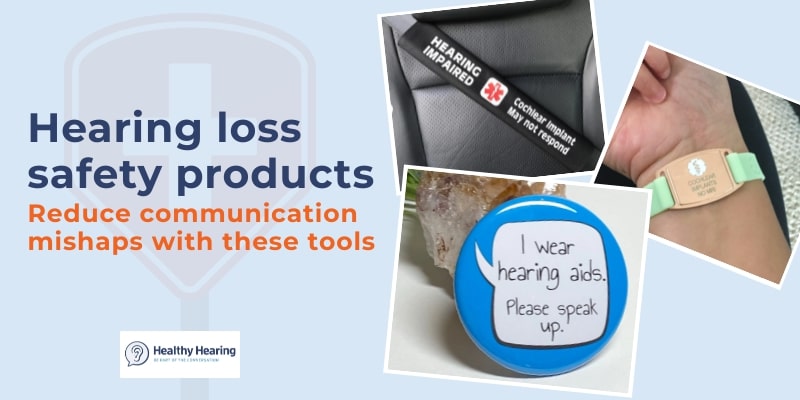|
www.HealthyHearing.com |
Air travel tips for people with hearing lossDon't miss a flight—or worse—due to miscommunication
Contributed by Joy Victory, managing editor, Healthy Hearing It's no secret that air travel has become more unpleasant in recent years. COVID-19, oversold flights, minimal food service and airlines' desire to squeeze more passengers in by eliminating legroom are just a few of the indignities travelers must suffer in order to get to their destinations. 
aids while going through security or on the plane. But for those with hearing loss, airplane travel can be particularly difficult. Hearing loss affects everything from pre-flight boarding to gate change announcements and in-flight communication, leading to frustration and misery. Masks and hearing aids are not easy to wear simultaneously, further complicating air travel. We still have a long way to go until all passengers can travel with equal access to services. If you're traveling with hearing loss, here are some tips for making your trip go more smoothly. Before your tripBefore you go, review our travel tips for people with hearing loss, including a suggested packing list, to make sure you're prepared for any minor hiccups—such as forgetting your hearing aid battery charger. You also may want to visit your hearing healthcare professional to make sure your devices are in good shape before you travel with your hearing aids. Don't forget your cleaning kit! Navigating challenges at the airport
miscommunication at the airport. After nearly missing several flights due to her hearing loss, Lise Hamlin now has a preparation strategy for getting through the airport. "Since then, I have self-identified at every point in the travel process: when purchasing my ticket, at the ticketing counter, at TSA security, at the airline gate, when boarding the plane, and if needed, at baggage claim," Hamlin shares in an article on flying with hearing loss for the Hearing Loss Association of America, where she is the director of public policy. She also has a hearing service dog to help her navigate complex hearing situations. Depending on the severity of your hearing loss, you may want to silently self-identify as a hearing-impaired person with safety products for hearing loss, such as pins. This can help avoid miscommunications, including potentially dangerous interactions with security, such as what happened with one woman at the Austin, Texas, airport, whose arm was broken, Hamlin notes. Getting through security with hearing aidsFortunately, you don't need to take out your hearing aids before you walk through security. If you do wear your hearing aid through security, you may want to let TSA personnel know. Depending on the device, you may get flagged for additional screening. If you're not wearing them, do not place them directly on the conveyer belt or in the plastic bins, as that may generate static electricity that can damage them. Ask for help instead.
Hearing loops in airportsAn increasing number of airports have installed induction loop systems, which consist of a loop of wire that produces an electromagnetic signal received directly by hearing aids. Telecoils used with induction loop systems allow hearing aid and cochlear implant users to hear more clearly despite the presence of background noise or poor acoustics. To be connected to the airport’s induction loop, you just need to switch your hearing aids to the “telecoil” or "T" setting. If you are not sure if your hearing aids have telecoils, ask your hearing healthcare provider. On board your flightThe good news: You don't have to turn off your hearing aids when flight attendants announce that all devices must be turned off and stowed away in seat pockets. The bad news: On-board entertainment, like TV shows and movies, may not have captioning. And pilots and flight attendants frequently make announcements that can be hard to hear—even for people with perfect hearing. Depending on the severity of your hearing loss, you may want to let a flight attendant know that you won't be able to clearly hear crew announcements. And it's not a bad idea to bring along your own entertainment, whether that be reading or downloading some videos on a tablet. Lastly, don't forget to take steps to avoid ear pain while flying. Know your rightsPassed by Congress in 1986, the Air Carrier Access Act has specific benefits for those with hearing loss. It states, in part:
Thanks to the ACAA and ADA guidelines for hearing loss, you have rights that will ensure a smoother travel experience: You have the right to indicate your need for special services when booking your flight, either online or over the phone. When given a list of options, select “hearing loss or impairment.” This will begin the process of alerting the airlines of your needs, both preflight and during the flight. It will not only be noted on the passenger manifest, but gate agents and flight attendants will be notified as well. You have the right to request disability seating and preboarding. This usually means close to the front of the aircraft. This seating allows you to pre-board as well as to see the flight attendants clearly so you are better able to understand them as they make in-flight announcements. Be aware that online booking sites might not mention that these seats are available, as the airlines would rather sell these seats at economy comfort prices; nevertheless be sure to ask. If the seats are available, they have to give them to you at no extra cost. Disability seats are intended for all disability groups, not just those with mobility issues. You have the right to the same level of communication with airline staff as the other passengers. Once you have self-identified to the airline as having hearing loss, you can make certain requests in order to make sure you are aware of all important information. For example, you might want to ask to be approached directly with notification of pre-boarding, any in-flight safety announcements such as turbulence, notifications of gate changes or late arrivals. More: Joy Victory, managing editor, Healthy Hearing
|
Featured clinics near me
Hearing Health Solutions from Ohio ENT - Columbus
974 Bethel Rd Ste B
Columbus, OH 43214
Earzlink Hearing Care - Reynoldsburg
7668 Slate Ridge Blvd
Reynoldsburg, OH 43068

Find a clinic
We have more hearing clinic reviews than any other site!


 Joy Victory has extensive experience editing consumer health information. Her training in particular has focused on how to best communicate evidence-based medical guidelines and clinical trial results to the public. She strives to make health content accurate, accessible and engaging to the public.
Joy Victory has extensive experience editing consumer health information. Her training in particular has focused on how to best communicate evidence-based medical guidelines and clinical trial results to the public. She strives to make health content accurate, accessible and engaging to the public.